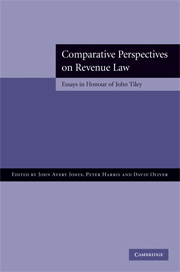Book contents
- Frontmatter
- Contents
- Contributors and affiliations
- Foreword by Dave Hartnett
- Foreword by Hugh Ault
- 1 A comparison of statutory general anti-avoidance rules and judicial general anti-avoidance doctrines as a means of controlling tax avoidance: Which is better? (What would John Tiley think?)
- 2 The judicial approach to avoidance: some reflections on BMBF and SPI
- 3 Comparing the application of judicial interpretative doctrines to revenue statutes on opposite sides of the pond
- 4 Abuse of rights and European tax law
- 5 The US legislative and regulatory approach to tax avoidance
- 6 The law of taxation and unjust enrichment
- 7 The history of royalties in tax treaties 1921–61: Why?
- 8 Land taxation, economy and society in Britain and its colonies
- 9 Meade and inheritance tax
- 10 Taxation, human rights and the family
- 11 Family connections and the corporate entity: income splitting through the family company
- Epilogue: Establishing the foundations of tax law in UK universities
- References
- Table of cases
- Table of abbreviations
- Index
5 - The US legislative and regulatory approach to tax avoidance
Published online by Cambridge University Press: 07 December 2009
- Frontmatter
- Contents
- Contributors and affiliations
- Foreword by Dave Hartnett
- Foreword by Hugh Ault
- 1 A comparison of statutory general anti-avoidance rules and judicial general anti-avoidance doctrines as a means of controlling tax avoidance: Which is better? (What would John Tiley think?)
- 2 The judicial approach to avoidance: some reflections on BMBF and SPI
- 3 Comparing the application of judicial interpretative doctrines to revenue statutes on opposite sides of the pond
- 4 Abuse of rights and European tax law
- 5 The US legislative and regulatory approach to tax avoidance
- 6 The law of taxation and unjust enrichment
- 7 The history of royalties in tax treaties 1921–61: Why?
- 8 Land taxation, economy and society in Britain and its colonies
- 9 Meade and inheritance tax
- 10 Taxation, human rights and the family
- 11 Family connections and the corporate entity: income splitting through the family company
- Epilogue: Establishing the foundations of tax law in UK universities
- References
- Table of cases
- Table of abbreviations
- Index
Summary
Introduction
It is risky, foolhardy even, to contribute an essay on anti-avoidance issues to a collection honouring John Tiley. No one deserves to be honoured more than John, of course, and anti-avoidance doctrine is one of his specialties. But what can I write that he does not already know or that he could not say more elegantly?
In fact, Tiley knows more than I do about everything (except maybe – maybe – baseball), and that includes American tax law. In a project Tiley undertook while visiting Case Western Reserve University in 1985–86, he studied anti-avoidance doctrines developed by US courts. In the resulting trilogy of articles in the British Tax Review, Tiley not only educated British lawyers about US law (and argued against unthinking importation of that law into the UK); he also forced those of us in the colonies to reconsider our instinct that substance should generally trump form. The US and the UK have different views about the relative importance of substance and form, and John was unconvinced that his home country had the worse of the arguments.
In Chapter 3 of this volume, Marty McMahon discusses the evolution of judicial anti-avoidance theory. I will make reference along the way to the judiciary, which has played such an important role in American anti-avoidance jurisprudence, but the focus of this essay is different. I examine statutory and regulatory developments that are changing American anti-avoidance law – with the hope that something here is new to Tiley.
- Type
- Chapter
- Information
- Comparative Perspectives on Revenue LawEssays in Honour of John Tiley, pp. 99 - 131Publisher: Cambridge University PressPrint publication year: 2008



